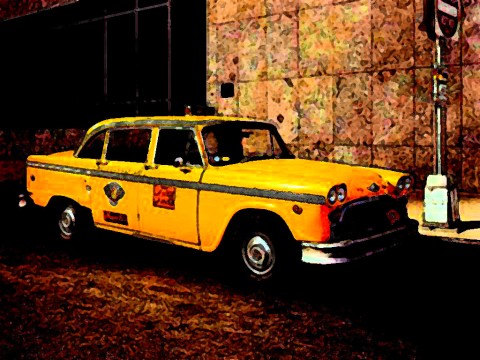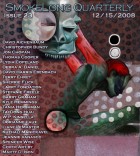We were usually alone at night. The five of us in that one swollen room. I was often the only one awake. She came bouncing in, all high-heel sounds and energy, smelling of perfume, beer and smoke. She was wearing a white dress with an orchid-colored flower centered above her breasts. She had a green scarf at her throat.
“I’m gonna be gone for a day or two,” she said, tossing money on the table, gathering lingerie, her toothbrush, cologne.
I could hear a taxi mumbling at the curb.
She kissed the sleeping heads, hugged me, said, “Take good care of ’em, Chris.” She whispered something about Phoenix, or was it New Orleans, and she was gone, tap-tapping down the dirty staircase, clicking down the walk, slamming the taxi door. There was someone in the back seat with her.
Four days later when she hadn’t come back, I was at the end of my rope. The bills had been ones, they looked like a fortune to a ten year-old, but they were gone quickly, even though I bought fruit and tomatoes, bread, milk, cereal over the protests of the children, who wanted chips, and candy.
The baby, Vanessa, was sick, fevery-eyed with a hurting cough. I washed her diapers in the toilet and sink, dried them on the blackberry canes in the yard.
The day before I remembered the old man in the back room on the first floor, who was always inviting me into his room, promising me a lot of money if he could look at me naked, if I would do things to him. I knocked on his door. He wasn’t a bad old man; he smelled of aftershave and peppermint.
“My sister is sick,” I said, looking him in the eye. “Give me twenty dollars, and I’ll come into your room for half an hour.”
He took the bill from a roll in his pocket, handed it to me, held out his hand to me.
I carried Vanessa to the drug store two blocks down, let the druggist, a bent-over man wearing a black-velvet skull cap, who smelled of pipe tobacco, examine her. He picked a bottle off a shelf, blew the dust off it, gave me some change, not much.
“Tell your mother she should try to keep her cleaner,” he said.
“I do the best I can,” I said. “We’re out of soap.” He stared at me, took a bar of pink soap, wrapped in cellophane off a shelf, handed it to me.
“Mazeltov,” he said, “you’re a good little mother.”
That night one of the other roomers called the police because Vanessa cried all night long, that high, sick wail that babies have.
“My God,” the police officer said, as he stepped into the room, the odors hitting him like a slap. “Where’s your mother?”
“She went away in a taxi,” I said.
“How long ago?”
I shrugged. I didn’t want to get her in trouble.
They sent in a social worker of some kind, a young woman armed with sacks of food and disinfectant.
She scoured the tub for half an hour, then bathed us one at a time. She produced nightgowns from a brown paper sack. Vanessa began to breathe easier. The police dropped by several more times, the word apprehended passed among them. They had checked airline schedules. Mother was coming back. The senior social worker would be there when she arrived.
Mother came bustling looking tired, wearing the same dress she left in, smelling strongly of herself.
“So, what the fuck?” she said.
The social worker had bathed us, sat us in row, according to age, on the sagging couch, all covered with one blanket, where we watched the black-and-white TV with the vertical bar that rolled at will. He was a small, lean man with glasses and short blond hair.
He used an official voice with Mother, not the soft, teasing voice he used with us.
The first time he said apprehended, Mother shushed him.
“Some of these kids understand,” she said.
“Let’s talk in there.” She pointed to the bathroom door with its antique porcelain knob.
They went in and closed the door. At first their voices were soft. Then they stopped altogether.
Then there were familiar sounds from my dreams, soft groaning sounds.
Mother came out and lit a cigarette.
When the social worker came out he didn’t look at us. He thanked Mother for being so cooperative, gave her his card.
We sat like a row of Russian dolls on the couch.
“Phoenix was a blast,” Mother said, licking her lips, drawing deeply on her cigarette.



 The core workshop of SmokeLong Fitness is all in writing, so you can take part from anywhere at anytime. We are excited about creating a supportive, consistent and structured environment for flash writers to work on their craft in a community. We are thrilled and proud to say that our workshop participants have won, placed, or been listed in every major flash competition. Community works.
The core workshop of SmokeLong Fitness is all in writing, so you can take part from anywhere at anytime. We are excited about creating a supportive, consistent and structured environment for flash writers to work on their craft in a community. We are thrilled and proud to say that our workshop participants have won, placed, or been listed in every major flash competition. Community works.